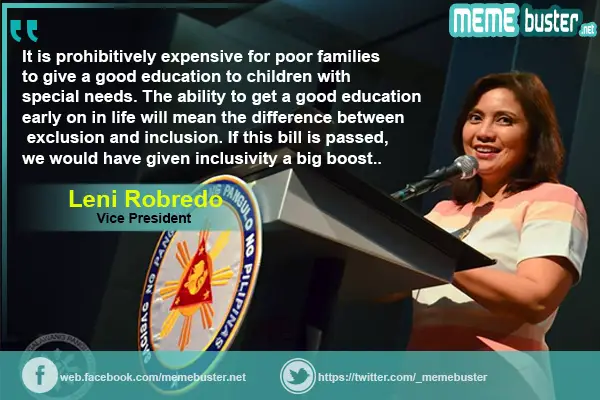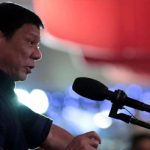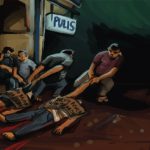Vice President Leni Robredo called for creating a law making special education (SPED) centers mandatory in public schools. Speaking during the photo exhibit opening of the United Nations Children’s Emergency Fund or UNICEF on July 18, 2016, Robredo stressed on the importance of SPED centers in public schools which has not been given due attention since the 13th Congress.
The UNICEF photo exhibit featured children with disabilities or CWDs.
The Vice President explained, “It is prohibitively expensive for poor families to give a good education to children with special needs. The ability to get a good education early on in life will mean the difference between exclusion and inclusion. If this bill is passed, we would have given inclusivity a big boost.”

According to a news report, only 620 of 34,000 public grade schools in the country provided either a SPED center or SPED program for their pupils in 2014. There are only 6,000 qualified SPED teachers are handling 239,000 school children needing special education, certainly showing a significant shortage in this aspect of the Philippine educational system.
Helping rehabilitate CWDs in early childhood is crucial. It is during the growing-up years that kids with special needs can be helped effectively with good care and learning top increase “their chances of becoming healthy and productive adults,” said Julia Rees, UNICEF Department Representative. It is also at this stage of development that “the future cost of education, medical care and social spending” is considerably lessened, Rees added.
Moreover, Rees said during the UNICEF launch: “Early childhood intervention can fulfill the rights of children with disabilities in promoting rich and fulfilling childhoods and prepare them [for] meaningful participation in adulthood.”
[ads1]
Establish an inclusive environment
Without due consideration for CWDs, the world is largely an exclusive environment that caters only to those who are not physically or mentally challenged. Thus, Robredo realizes the need, not only to have SPED centers in public schools, but also to build communities that are amenable towards people with disabilities, especially kids, and create an inclusive environment.
This is also why Robredo, as the appointed head of the Housing and Urban Development Coordinating Council (HUDCC), said that they will build communities that can accommodate those with disabilities.
“If we design communities with those who have special needs in mind, I am positive that everyone will benefit, and we would be literally reshaping our world to become a better one,” Robredo said.
She even cited how texting, which was actually designed for the deaf, is now being used by everyone.
In addition, she vowed to treat CWD concerns as priority in her office. The concerns include universal healthcare, hunger and food security, education, rural development, people empowerment.
Accordingly, about 8.1 percent of Filipino children with ages 0 to 18 years old are challenged with disabilities.
During the campaign for the May 9 elections, Robredo’s biggest campaign promise was to help those at the fringes of society, creating a “gobyernong para sa laylayan.” She repeated that promise during her speech after her oath-taking as the Vice President of the Philippines. And it looks like with her desire to build more SPED centers in public schools, she is on her way to making sure that Filipinos with disabilities, especially the kids, will grow in a Philippines with an ‘inclusive’ environment.
[ads3]


